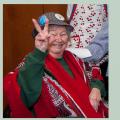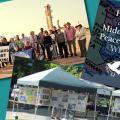By Maureen N. Eke, Program Chair
To be relevant, we must be visible. WILPF is visible when you speak and act! So, join us, beginning this March, in a conversation as we transform the suggested ideas from the October 2015 retreat in Des Moines, Iowa, into a draft document.
After several weeks of planning, we arrived in Iowa. Des Moines Branch served as our host for this weekend, performing several functions, including feeding us, providing us with transportation and accommodation. We met at a historic former firehouse that has served as a meeting space for peace and justice groups for decades.
Program chairs Maureen N. Eke and Odile Hugonot Haber facilitated the meeting aimed at examining the strategies WILPF US uses to accomplish goals and work collaboratively across issue committees, branches, and membership. We began with brief reports to familiarize one another with and update ourselves on our current work.
It was clear that as WILPF US members, we are committed to WILPF and our work, many of us being active members of WILPF and working in our specific areas of interests for decades. These wise members provide us with excellent models.
We also have great examples in a new generation of women, strong and equally committed, who are working in some existing and emerging areas of interests. We continue to be present at the annual Commission on the Status of Women. Six WILPF US Issue Committees remain strong, working in a variety of issues:
- Advancing Human Rights/CEDAW
- Corporations v. Democracy
- Cuba and the Bolivian Alliance
- Disarm/End Wars
- Earth Democracy
- Middle East
In short, as WILPF US, we have passion for our work and our strength lies in that passion and commitment.
But, we were also honest about areas of concern, potential areas of weakness, and perhaps, potential areas of growth. For this, the new WILPF US Program Chair Maureen N. Eke led us through some strategic thinking so that we could identify emerging areas, or those that need strengthening. Indeed, the retreat provided us with tremendous opportunity for critical self-examination. While acknowledging areas of weakness, such as poor communication between WILPF US Board/leadership and branches or among branches, or even between Issue Committees, we explored ways to further grow WILPF. The critical self-examination and program strategic thinking resulted in the identification of three broad goals (suggestions from the working groups) as important areas to focus and/or strengthen or develop to help make WILPF US more visible in the next two-three years.
Beginning this January, a working group consisting of the two Program chairs and four other WILPF US members will attempt to give our retreat-suggested goals and feedback from members some coherence by developing an initial draft document. We invite your feedback through your branches or as individuals as we share the draft document with you throughout this process.
WILPF belongs to you. Make your voice count!
Photo: Participants in the WILPF US program retreat in Des Moines, Iowa, pictured from left, Jan Kubiac, Ellen Thomas, Carol Urner (seated), Marybeth Gardam, Joan Brannigan, Odile Hugonot Haber, Lamia Sadek, Maureen N. Eke (front), Ariane Blondin (back), Mary Hanson Harrison, Cindy Domingo (in shadow), Robin Lloyd, Nancy Price (back), Barbara Taft (front), Melissa Torres, Barbara Nielsen and Penny Hansen. Credit: Ellen Thomas

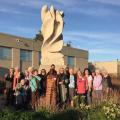
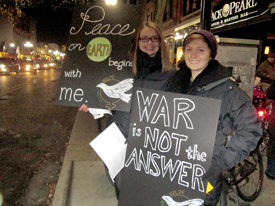 The situation of refugees was highlighted by another speaker. The
The situation of refugees was highlighted by another speaker. The 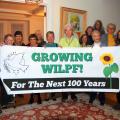
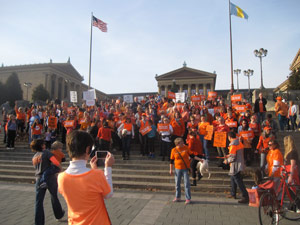 Members asked questions to help the branch understand the current state of WILPF at the section level. Members told the board president about the activities of the branch, including participating in a local high school’s peace walk on International Peace Day. Other activities that members are proud to be a part of include: working for sensible gun laws, taking part in the (Drone) Death Walk to raise awareness of drone activity by our country, and recent participation at the US Social Forum.
Members asked questions to help the branch understand the current state of WILPF at the section level. Members told the board president about the activities of the branch, including participating in a local high school’s peace walk on International Peace Day. Other activities that members are proud to be a part of include: working for sensible gun laws, taking part in the (Drone) Death Walk to raise awareness of drone activity by our country, and recent participation at the US Social Forum.